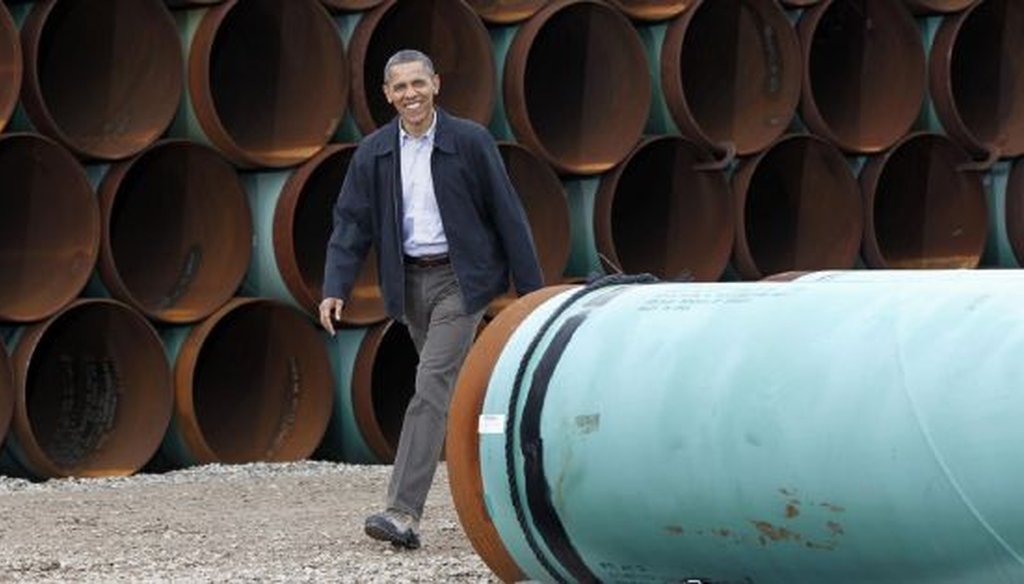Stand up for the facts!
Our only agenda is to publish the truth so you can be an informed participant in democracy.
We need your help.
I would like to contribute

In 2012, President Barack Obama toured the TransCanada Stillwater Pipe Yard in Cushing, Okla. (AP file)
After eight years of studies, more studies and much soul-searching, the Obama administration on Nov. 6 rejected the Keystone XL pipeline.
"America’s now a global leader when it comes to taking serious action to fight climate change," President Barack Obama said, flanked by Vice President Biden and Secretary of State John Kerry. "And frankly, approving this project would have undercut that global leadership. And that's the biggest risk we face, not acting."
Energy analysts expect some sort of new pipeline proposal to emerge eventually. But while Keystone XL is gone for now, it has left a legacy. It inspired many claims and assertions. Some of them were even true. Here’s a sampling:
***
On Nov. 14, 2014, President Barack Obama said Keystone XL allows "Canada to pump their oil, send it through our land, down to the Gulf, where it will be sold everywhere else."
That rated Mostly False on the truth-o-meter. The general consensus among experts, as well as the State Department, was that American refineries would be the primary buyers of crude oil transported through the Keystone XL pipeline, by a vast margin. Some Keystone XL critics had a point that American refineries would likely export some of the products that they make with crude oil transported by the pipeline. However, American refineries tend to keep more products in the country than they export.
***
The Keystone pipeline and jobs packed a punch in the 2014 midterm elections. In Colorado, Republican Cory Gardner who won his senate bid, took a swing at his challenger, Democratic incumbent Mark Udall, who voted against fast-tracking the pipeline proposal.
"The Keystone Pipeline would create good-paying jobs," Gardner said. "Not only where the pipeline is being built, good-paying construction jobs, but manufacturing and service opportunities in Colorado along with the Keystone Pipeline. We would create thousands of jobs in Colorado, if the Keystone Pipeline were to be built."
We rated that Mostly False. Gardner based that statement off an old study that measured the overall impact of the Alberta oil sands on the U.S. economy, not the Keystone XL pipeline specifically. The State Department study cited by the company building the pipeline estimates that the equivalent of 30,000 direct, indirect and induced temporary jobs will be created in states outside the pipeline’s projected route. However, it didn’t specify how many of those would be created in Colorado.
***
Then-House Speaker John Boehner hit the jobs theme hard in a USA Today op-ed on June 25, 2014.
"The nearly six-year delay in approving Keystone is costing Americans more than 100,000 jobs and nearly a million barrels of oil a day," Boehner wrote.
That claim rated False. Boehner was citing a study that experts said was "flawed" and the company in charge of the project, TransCanada, said was "no longer relevant." The State Department estimated a much lower amount, and TransCanada cited that study to PolitiFact.
***
On Fox News Sunday, Sen. Chris Coons, D-Del., said "Keystone means unlocking the Canadian tar sands, some of the dirtiest sources of energy on the planet, and allowing those tar sands to go across our American midwest and then reach the international market."
We rated that Mostly False, on Jan. 11, 2015. Oil production has been steadily growing in the Canadian tar sands without the Keystone XL pipeline. Most experts expect that trend to continue despite current low oil prices.
***
Liberal pundit Thom Hartman picked up a Pants On Fire rating for his claim that the Koch brothers will turn a $100 billion profit if the Keystone XL pipeline is constructed.
The origin of the Keystone = $100 billion for the Kochs line stems from a 2013 report from the International Forum on Globalization. While that group may sound neutral, it in fact opposes "free market" institutions such as the World Trade Organization, International Monetary Fund and North American Free Trade Agreement. The group also makes no secret of its opposition to the pipeline and Koch Industries. It produced an October 2013 report, "The Billionaires’ Carbon Bomb: Koch brothers and Keystone XL."
Experts in energy, economics and business called the methodology behind the report and its $100 billion figure "absurd" and "puzzling." The Kochs hold oil leases in Canada. We're not ruling out that they could benefit in some ways from the Keystone XL pipeline. But trying to extrapolate their oil-sands leases into a specific profit figure is sheer folly.
***
The debate wasn’t devoid of accurate statements. Liberal analyst Van Jones got a True for saying the Keystone pipeline creates "35 permanent jobs" after construction. That’s what a major State Department report found.
***
And Sen. Joni Ernst, R-Iowa, received a Mostly True when she said, "A strong majority of Americans support" the Keystone XL pipeline. Ernst was giving the Republican response to the president’s 2015 State of the Union address.
We looked at a number of polls and found that between 56 percent and 60 percent of the public has consistently supported the project when asked outright whether it should be built. However, one poll found public concern about building it before reviews are complete -- a stance more in tune with Obama than with Republican leaders.
Our Sources
See original Truth-O-Meter items.














































